Iraq From the Inside
Iraqi journalist Huda Ahmed, who has recently been granted asylum in the U.S., looks back on more than five years of war and occupation from an Iraqi perspective.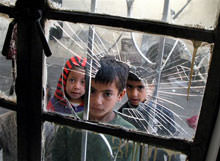
Iraqi journalist Huda Ahmed, now a refugee, looks back on more than five years of war and occupation from an Iraqi perspective.
Click here to listen to this interview.
Transcript:
James Harris:
This is Truthdig. James Harris here with Huda Ahmed. She’s an Iraqi native. And in 2007 Huda also received the Courage Award for Journalism for her coverage of the war in Iraq. I’m talking to Huda today because I felt the need to get a stronger sense of the effect that the war has had on Iraqi citizens. And I, frankly, just don’t feel that we get that sense, living so far away from where the action is. But I feel like when I watch the news and I look around, a lot of it has become cheapened by the fact that they’re saying the surge has worked and that we’re starting to see progress in Iraq. And, “At what cost?” is the question that we’re asking today. So, at what cost did the surge work? Huda, we’ll start simply by asking, how do you feel when you hear, “The surge is working”?
Huda Ahmed: It made me outrageous when they started to publicize for the surge success. Not like disrespecting, you know, the sacrifices of American male and female soldiers back in Iraq who are fighting alongside with the Iraqi security. But they are ignoring the huge efforts from the Iraqi side. It’s a kind of disrespecting the Iraqis for the efforts that they have, gave to help alongside with the American forces. Starting with Sunni tribes from Anbar. When they started to form Awakening groups, which we call it in Arabic sahwa, they started to fight back the Qaida. They started to form conferences, months before the surge was decided. And they were asking for the support from the Iraqi government and from the coalition forces at that time. So we were watching that while we were in Iraq, and there was no word about surge, or any idea about that when those Awakening groups started to fight back.
Then we had the surge come into Iraq, sending their units there to Iraq. The surge couldn’t have succeeded if they didn’t realize that they should have worked together with those Awakening groups, the Sunni tribes. They found that this is a unique opportunity when they started to watch the Awakening groups coming after the Qaida leaders and fighting them. So they found that this is really a good opportunity for them. “Let’s, you know, work together with them and support them.” Beside the truce announced by Moqtada al-Sadr, the anti-American Shia cleric who froze his movement for almost six months. The Iraqi citizens, the civilians, they started to send information about any suspicious groups around their areas. The Americans started to know how to reach out to the Iraqis to help them to feed them with the information. Instead of throwing flyers on the streets where the people will be so afraid to pick them up and, you know, from the streets because they are watched by the insurgents and by the militia. So, the American troops started to use the loudspeakers and started to give the numbers, the hotlines to allow the people to call them and give them information.
So if there was no cooperation from both sides, I don’t think the surge would ever, ever, you know, succeed, you know. So it is a big success for both.
Harris: Mm-hmm.
Ahmed: Not only for, you know, the American Army.
Harris: Frankly, we haven’t heard much about that celebrated success, that unification that’s happening in Iraqi communities that is necessary to get this done and to get Iraq back on track.
Ahmed: Yes.
Harris: Huda, how do you feel about your country at this particular time, it being occupied by American troops?
Ahmed: I think any country is occupied by any foreign force, they would seek for their independence, for their sovereignty, and that doesn’t exclude Iraq from that point. People went through a lot since Iran-Iraq war, the sanctions. … The hardship of sanctions were terrible. And then, you know, the war of 2003. And people were crazy about that moment when toppling Saddam Hussein and then they saw freedom coming to them. And they were, for a short time — a very short time, because they were traumatized afterward — they were waving for the troops, for the American coalition forces, the troops, thinking that they’re gonna make huge change in the lives of the people there. But, unfortunately, the huge change they brought with them was very dramatic, was to the worse, not to the better.
So, we have sacrificed a lot, to reach to the point now — there is the 2008, there is big improvement in, you know, security, but under what cost? If the things were not misconducted, back after the war, none of this would happen. None of hundreds of thousands of Iraqis would die, including women, children, young men, old men. … We wouldn’t see many Iraqi refugees being displaced inside and outside Iraq. Iraqis thought that — especially those who worked with American forces, with the American NGOs, Western NGOs, with the media, with the Embassy — that they would be supported, they would be helped if they need for help. But they were abandoned once they got threats, death threats from the militia, from the insurgents; they found themselves alone. They were deserted by the people that they thought that they are their friends, that the Iraqis helped them, translate for them the language, the culture, the traditions, the religion, you know, and made it possible and easy for the Americans to conduct their policy and their process in Iraq. They felt that they were abandoned. Then they realized that they undermined the Iraqis, that they turned their back against them. And then many of them died. They got death threats and they died because they were abandoned. The help came late for the Iraqi refugees who worked with the Americans. You know, any Iraqi who worked with the American troops or with the NGOs or with media, they could have sell them out. They could have betrayed them. They could have, but they didn’t. They put their lives before the lives of the Americans. You know, they protect them. Click here to listen to this interview.
Harris: Why did they do that? I mean, what reason did they really have? Was it the belief that the Americans were bringing something greater, or …?
Ahmed: That’s what they thought. They thought that if they worked together with the American forces and the American government that it will fasten the withdrawal of the American forces, it will help to rebuild, reconstruct their country, OK? They were welcoming the freedom and democracy, so they were trying to learn from the Americans, at the same time, to educate the Americans about their country: what the ambitions, what expectations of the people. And besides, back there the Iraqis are so dedicated in their work, they are dedicated in their lives, very sophisticated people, very educated. Not because I’m Iraqi, but it is known all over the world what the Iraqi is, who he is. Back there it’s a shame that you betray your own guest, even if she or he is a stranger. It doesn’t matter. Even if he’s affiliated with the occupier. Because they believe that it’s worth it. If we lose our lives to achieve something better, a good future for our next generation, for our children, yes, let’s do it.
Harris: Five years down, who knows how long to go in this conflict, in this war. Huda, what do you fear most about the relationship between Iraq and America? And further, as we imagine the two countries together for the next 10 years, what will those 10 years be like?
Ahmed: I hope that the relationship between U.S. and Iraq gonna be based on mutual respect, mutual admiration, you know, cooperation, not undermining from any side, from either side. But we didn’t see that when the coalition forces came to Iraq in 2003. We thought they gonna have a huge respect for the Iraqis.
Harris: Mm-hmm.
Ahmed: They did not. You know? And we found that that, the way they treated the Iraqi detainees in the detentions, especially Abu Ghraib. All the Iraqis were shocked, you know. They could have expect anything except that. And also the American contractors. You have thousands of them in Iraq, doing whatever they like. Killing, raping, stealing. And they are not prosecuted by any law. Not the Iraqi law or the American law; they have immunity, so. … Also, not protecting our Iraqi heritage, the history. I don’t know what did you save in Iraq. You didn’t save the lives of the Iraqis, you didn’t save the Iraqi history, you didn’t save the Iraqi heritage, you didn’t save the Iraqi rights. I don’t know what kind of example of democracy and liberation did you bring to the Iraqi minds. All we knew from you is violence; that’s all we learned from you. OK? We learned the arrogance that you came and received the Iraqis with, dehumanizing them. If you are coming to bring democracy, why would you dehumanize the people? You dehumanize the people in war, the enemy, but not the people that you expect gonna be your friends. You send people to change the religion of the people there in Iraq, to convert them from Islam to Christianity or whatever the religion is. So I hope that the Americans learned from the lessons of the past five years that Iraq is a different country, a different nature, different culture, different, you know, tradition and religion, and all these should be respected. Let the Iraqis decide for themselves what kind of democracy they want, that’s gonna be adjusted and cope with their traditions, with their values, what kind of freedom they want. Because we know that it is totally different world and you cannot make Iraq as an example of U.S., otherwise we would never have our roots. You are just gonna cut the roots of the Iraqis, and they cannot survive without their roots. I hope that in the future that’s what Iraqis are expecting, and that’s what they are dreaming, that there gonna be a relationship based on respect from both sides. You are going to respect the world of the Iraqis. They are willing that you withdraw from Iraq. OK? And respect their rights, and go with it. But don’t try to undermine them or patronize them, and bringing ready solutions, saying that you are the thinkers and we are not. Like the surge and the experiments before. Iraq is not lab for your experiments. OK? Because in every experiment you are trying, many people are losing their lives. All you hear about is casualties, but you never questioned each casualty, who he is, or who she is. What was she doing, what their dreams, what their expectations, what their ambitions? Maybe … they loved the Americans but when they died they hate them because they were killed, because of the … maybe their families, they hate them, because they lost their loved ones, the ones that support them, you know? So I hope that there will be this kind of good, strong relationship between Iraq and America, because Iraq don’t want to go through wars anymore. They are devastated. They just want to live in peace. They want to live a natural life, send their kids to schools, build their country on freedom, on rights for everybody, and try to survive in harmony with all the ethnics and sects without any discrimination.
Harris: How do they feel about Barack Obama over there? Is he somebody they feel could make some of the things you just mentioned reality?
Ahmed: Uh … besides saying that he’s handsome …
[laughter]
Ahmed: … and articulate person. … There are mixture of feelings back in Iraq, a mixture of thoughts, but the dominant thought in Iraq, that he’s just one person, OK? And he cannot take all the decision by himself. There are, you know, policy, there is a process that he has to work according to it. Some of the people … we were talking about it, about the middle name, the Muslim middle name, you know, his middle name: Hussein. Some of the naive people in Middle East — not only in Iraq — they believe, yeah, oh, he is, you know, Muslim, so we have a Muslim president in America, the superpower country. There are some people, yeah, they were joyful about that. But there’re people who looked at him as a black man, you know, in Iraq, because in Iraq and Middle East — especially in Iraq; I’m going to talk about Iraq because I’m Iraqi; I lived this experience there, I was born and raised — at that time the dictator used to show us through the Iraqi state channel, old movies about discrimination, slavery against the black people. And we’ve read a lot about the history, about the people in the U.S., the Civil War, and the atrocities against the black, the Indians, the Native Americans and the other minorities. So seeing Barack Obama as a black person heading for presidency, the people there would say, Iraqis would say, maybe a black man like him, as a person from minorities, would feel what we have been through. Because they don’t know if he was from slavery generation or whatever; they see him as a black person so they will feel, they would say, “He would feel what we went through.” What the Iraqis have suffered. Maybe that he will be wise enough to try to find the good solutions and try to reshape the foreign policy of U.S. toward the world. Others will say there will be no change. Click here to listen to this interview.
Harris: Same policy, different color.
Ahmed: Same policy. They feel that the words, the glittering words that he is using is just because of the campaign; it’s just politics. But they don’t believe that he’s gonna fulfill them, especially when talking about the withdrawal of the American troops in 16 months, which is very ambitious. And especially the Iraqi prime minister, Nuri Kamal al-Maliki, had respond to it, and, you know, he welcomed it. Though he didn’t want to take any side. But Iraqis are still afraid that this is too fast. They want the American troops to withdraw, but if you’re gonna withdraw you have to withdraw with responsibility, not as reckless as you came to Iraq in 2003. It has to be steady, gradual, responsible. And if you withdraw whether in 16, 18, 20, 24 months, no matter what happens in Iraq, violence is gonna be violence, OK? Because it’s a country that’s full with weapons, with ideas because of the wars that it went through. So just do it, but the problem is that the Iraqis are still hesitant about it. I’m talking about the Iraqi people, not the politicians.
Harris: Mm-hmm. The real people.
Ahmed: The real people that they want to feel that they will not be vulnerable, because they are the soft targets. And they want to feel that they can really trust their own security, the Iraqi army and the Iraqi security, that if U.S. proceeded a really gradual withdrawal from Iraq, there would be no huge violence after they withdraw. So, you know, the kind of tactics that has to be taken care of.
Harris: One day, do you see yourself with the nephews, the cousins, playing on the slides in Baghdad? Is that the kind of place, maybe it could turn out to be, if your hopes and wishes come true?
Ahmed: You know, we have learned, the Iraqis learned to be hopeful, all their times, even under dictatorship. I remember when we were going through Iran-Iraq war or the Gulf War, the first gulf war, or the sanctions, we were saying tomorrow maybe gonna be better day, tomorrow maybe gonna be better day. And that’s what I’m hoping for. Though I cry every day because I miss the laughters of my nephews. I miss everything about them. I miss my family, my mother, my sisters and my brothers and my nieces and my nephews, that I am not there with them, to share every moment. And I cannot be with them for different reasons. But I wish that I will see them soon, whether here or in Iraq, and I will play with them, even if they are now teenagers. But I will have the time to talk with them, to communicate with my own nephews, because they are like my children, and see their ambitions, their dreams, and fulfill it for them. And so I hope not only my nephews and my nieces or my family, but every Iraqi family because they really deserve a change. I mean, the Iraqis really deserve a better life, a better future, no wars, no sanctions, no violence, no bombings, no dictatorships, just freedom, free expression, live their lives. Not to involve them in any political crisis or — how shall I say this? — whatever the problems that the politicians have between each other, to keep the people away from their agenda; let the people live their lives. Now when … I talk with my family and I ask them about electricity, because in Iraq they live their life now without electricity. It doesn’t exist. They buried it, according to them. They said, “We made the funeral for our electricity.”
Harris: No lights, nothing. The sun goes down, candlelight.
Ahmed: No, they have, they use the generators back in Iraq.
Harris: OK.
Ahmed: But there is the turmoil of going through how you get the gas, the soaring prices of the gas, and the food and the lower rates of salaries and how the people try to cope with that. And then you have the bribes and blackmails and corruption going around in Iraq. But they don’t talk about electricity or whatever. No. They say, “Our much joy when we can go to restaurant where we can eat with our families, that the most joy.” You know. They don’t want to argue about electricity or about shortage of water or gas or whatever. They say, “At least we can go to the ice cream shop and we can eat with our children.”
Harris: Yeah.
Ahmed: They can get out from the house that we imprison them in, you know. That they can see the streets, they can see the trees. They can communicate with their friends that they couldn’t see them because they live in other neighborhoods. And I hope, as many Iraqis, they hope that even the walls that are surrounding the neighborhoods back in Baghdad, they all gonna be, gonna fall and gonna be demolished and the residents of all, of mixed neighborhoods, gonna go back together and communicate with each other and we can travel around, walk around, and drive, go there, shop there, and you know, have fun. That’s what we want. Rebuild our country and just move on. That’s what we want. Iraqis just don’t want to think about oil. Just tell you, “You want oil? Just take it! We don’t want it because it’s been a curse on us. We haven’t seen a good day in our lives since the discovery of the oil. If you want it, just take it, but we want to live our lives. That’s what we want. That’s all.” Because they have built themselves by themselves, without the help of the government. They did it by themselves without the help of, you know, oil revenues. So let’s hope for the best for Iraqis.
Harris: Got hope?
Ahmed: Got hope.
Harris: That’s some guy’s slogan. Huda, you’ve certainly helped us realize the importance of the civilian side, of the human side of this, because this is not just politics. This is not George Bush talking about the surge work. This is not Barack Obama talking about a 16-month withdrawal plan; these are lives. And we’ve seen estimates from 100,000 Iraqi civilians dead to 750,000 Iraqi civilians dead. And those numbers are mind-numbing, they’re stifling, and they hurt. Thank you for your courage. Obviously, the Courage Award for Journalism was …
Ahmed: With my own colleagues.
Harris: … with your own colleagues, was well deserved. And thank you for bringing some humanity to the story, and I hope we can continue to talk as things develop in Iraq.
Ahmed: Thank you. I would love to. I would love to be here again with you, James.
Harris: For Huda Ahmed, this is James Harris, and this is Truthdig.
Your support matters…Independent journalism is under threat and overshadowed by heavily funded mainstream media.
You can help level the playing field. Become a member.
Your tax-deductible contribution keeps us digging beneath the headlines to give you thought-provoking, investigative reporting and analysis that unearths what's really happening- without compromise.
Give today to support our courageous, independent journalists.
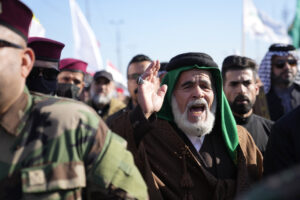
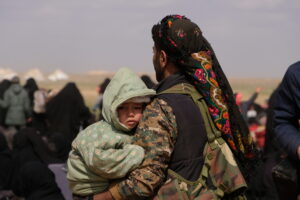
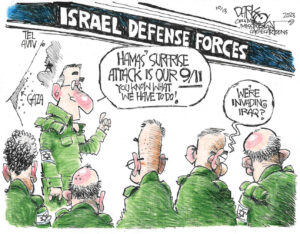

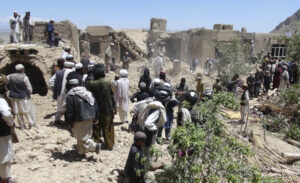
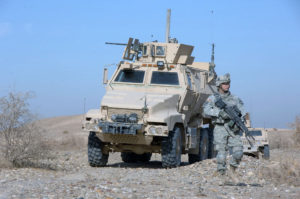
You need to be a supporter to comment.
There are currently no responses to this article.
Be the first to respond.